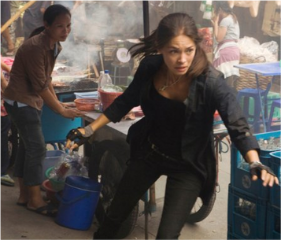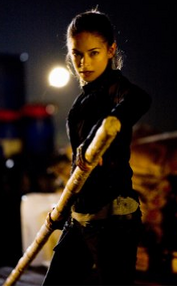
Seven was the charm for Jimmy Fallon to find his "Late Night" hosting groove by making Emily Blunt comfortable enough to enjoy a pretzel and orienting formerly hard news monologue jokes toward booze and monkeys.
Maybe there really is Vodka in his mug? One can only hope that the young host can keep up this momentum by telling more bawdy jokes, desisting from interrupting his guests and breaking free from catering to the network's need to sell commerical products the way he did during the first six shows.
Fallon's first few monologues were rushed as he was clearly trying very hard to read the cue cards without messing up. His lackluster jokes came with obvious punch lines about the news of the day that were not in accordance with comedy's offensively risky function of chipping away at societal norms.
Airing beyond prime time is an opportunity for Fallon to really let loose a few jokes that would have a few objectionably uptight viewers writing letters to NBC's censors now that he is more comfortable in front of a studio audience and TV cameras.

A promising part of Fallon's first monologue was the sexually suggestive slow jam about the U.S. stimulus package that was hip and novel enough to make a news joke funny.
More often than not, late night talk show hosts become stuttering fools who try to comically digest news stories, the details of which they know very little, instead of just goofing on them the way Jon Stewart does in a humorously collegial manner. Just listen to Fallon mention anything about the U.S. troops in Iraq to see how these news items are too sensitive and intricate for comedians to exploit in order to get a rise out of an audience.
The new host of "Late Night" would do well to adopt something similar to Stewart's comedic formula, poke fun at more mainstream news items too absurd not to be funny such as The Octomom, or talk about tech and TV shows that his 20-something-year-old interns probably love.

Facebook's status function, "Internet Video of the Day" and allowing an audience member to sing one of Jon Bon Jovi's own songs in front of the musician made for fun segments simply because a lot of people are into social networking, surfing for random video-inspired laughs on the Web and rock music.
But why does Fallon have a laptop on his desk? It seems a bit overkill.
If anything, Fallon shines when he appropriately directs his energy toward pleasing the youth demographic by singing with Justin Timberlake and dancing with Cameron Diaz, or he does just as well making light of such pop culture phenomenon such as "Gossip Girl" and Steve Wozniak's dance moves on "Dancing with The Stars."
Pandering to or knocking pop culture should help carry the show at least until Fallon grows into his late night groove and before he and his mid-30-something-year-old celebrity friends come off as sad old people trying to be cool.

Though, having audience members lick consumer products, settle the feud between Angelina Jolie and Jennifer Aniston by pretending to be them and a disruptive history buff in the audience geeking out about The Gadsen Purchase is too sophomoric or pointless to even inspire sympathy chuckles.
What Fallon should take more seriously than anything else is his too casual interviewing style that noticeably causes guests to wonder what to say after he spouts out continuous sentence fragments, struggling to sound somewhat coherently folksy. It is as though Fallon is hanging out with friends, but suddenly remembers he is on TV and freaks out. This is probably why he completely blew any chance of having a stimulating conversation with Robert DeNiro.
Only when Fallon is already well-acquainted with someone such as Tina Fey, Drew Barrymore and Timberlake do the interviews flow well, calling into question whether his staff even bothers conducting pre-interviews with guests with whom he has not already established a rapport.
Further detracting from the show are droll video segments involving blonde suburban moms, an outreach program for struggling corporate CEOs and a flashback competition that are only good for a few, if any, chuckles.

Any momentum Fallon does establishes is quickly diminished when he gets off on a tangent about anything mildly funny that gets a pop out of the audience, sizing up the quality of his own jokes with air bowling, or dwelling on some minor detail just to remind everyone that he is still there.
A possibly catastrophic consequence of Fallon's insistence on being a part of every laugh occurred when he debated a noticeably perturbed Amanda Peet about the proper pronunciation of her film "2010" and then did not seem to know anything about her past cinematic work.
Trivial, but sure to hurt Fallon in the long run is how closely he appears to suck on the network's metaphoric tit by orienting segments around marketing an 108-inch Sharp flat screen and carpet samples, not to mention making sure not to sing verbatim the copyrighted "Happy Birthday" song.
He should just run with whatever is hilarious and apologize thereafter for hurting anyone's feelings, obligating the network to create fake Web sites used in gags, or angering censors the way Conan O'Brien did.
It is not as though Fallon has not already used the self-deprecating humor the former host of "Late Night" often adopted to downplay bad monologue jokes.
If Fallon learns from his first-week blunders, still unconvinced critics might yet sing his praises seven more shows from now when he possibly becomes a Conan epigone, bearable enough for which to stay up late, or becomes his own man.
God speed Jimmy Fallon!
Show more!



































